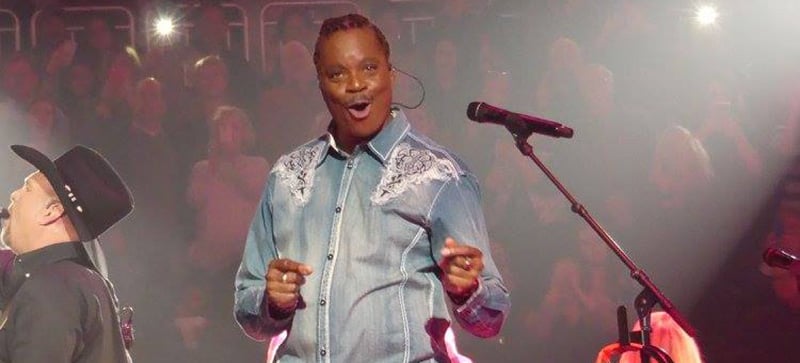 Robert Bailey performing on stage. Photo courtesy Amanda Deets, Down Memory Lane Photography
Robert Bailey performing on stage. Photo courtesy Amanda Deets, Down Memory Lane Photography
Robert Bailey Jr.’s life has been defined by so much light.
The white hot glare of the steel mill smelter in Middletown, Ohio, where father Robert Bailey Sr. worked until 1959, when he lost his job for having the audacity, as a Black man, to ask for a promotion.
The beacon of hope that was Portland and a chance at a new life on the West Coast for Robert Sr., wife Joan, and children Ora, Jodell, Tracey, Bradford, and Walter.
The soft shine of the lights in bars throughout Eugene where Robert Jr. sang and played the piano on beer-soaked stages in the evenings with his band Shinola—and, on occasion, blues legend Robert Cray—after spending his days as a student in the University of Oregon’s School of Music and Dance.
And then the white hot glare of the spotlights illuminating stadiums and arenas around the world where Robert Jr. entertains tens of thousands of country fans night in and night out alongside megastar Garth Brooks.
Robert Bailey Jr.’s life has been defined by so much light.
But, to appreciate the light, you have to have survived the dark—and Robert Bailey Jr. has seen more than his share of that, too.
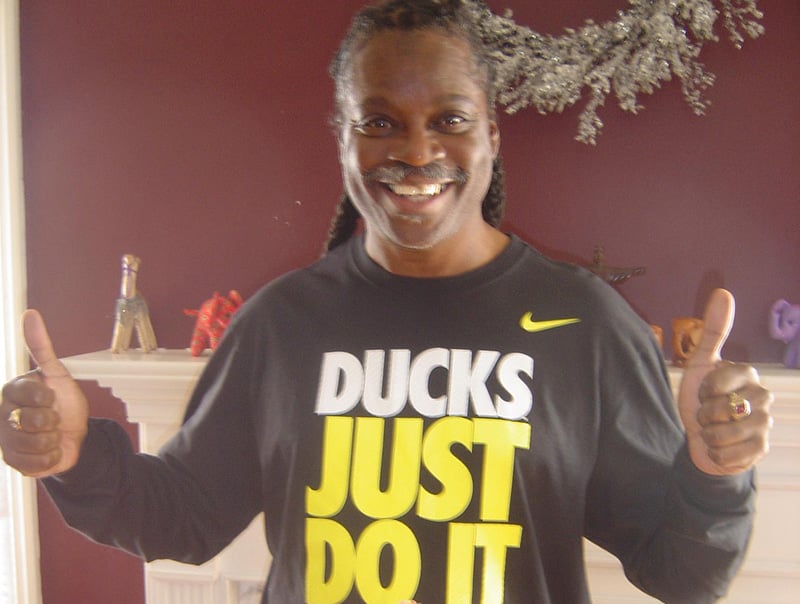
Bailey supporting the UO football team before the 2013 Fiesta Bowl. Photo courtesy Robert Bailey.
“The first few years in Portland were a struggle, but once my dad got a foothold he got a job working for the gas company and they eventually bought a house,” said Bailey. “As a housewarming gift my dad bought an old upright piano and had it delivered to the house, surprised my mom, and just kind of spontaneously we all sort of gathered around the piano.”
That was the beginning of the singing group The Bailey Family, and, for Robert, a musical career with as many peaks and valleys as his tenor vibrato. Joan rearranged old hymns and gospel songs, and the family performed in churches throughout the Pacific Northwest and Northern California.
Robert continued singing throughout high school, paying for his own voice lessons from a tutor in the Fine Arts Building in Portland and competing in contests and recitals, and while his college decision came down to two schools—the University of Oregon and Notre Dame—in his heart there was only ever one.
“Oregon was my first choice because I knew they had a great music school,” he said.
Bailey attended the UO for three years on a classical voice scholarship, taking vocal lessons from opera director Leslie Breidenthal during the day, and putting theory into practice in bars throughout Eugene in the evenings. He joined a group called Shinola, who recorded at Raspberry Records, a 16-track recording studio in what is now the Oakway Center on Coburg Road, and also collaborated with blues musicians Robert Cray and Curtis Salgado, who were regulars in Eugene while touring the West Coast’s Chitlin’ Circuit. While Shinola’s time in the spotlight came to a halt one fateful night when a bar owner found out Bailey was not yet 21, he did perform long enough to see himself firmly entrenched in Eugene music lore.
“During one of our gigs at one of the bars John Belushi actually came into the bar and heard us sing,” said Bailey. “We thought that was kind of weird and wonderful, but then afterwards he said that he was here scouting for African Americans for spots in a movie he was going to make, and would we be interested in being in the movie? So, that's how I got into Animal House.”
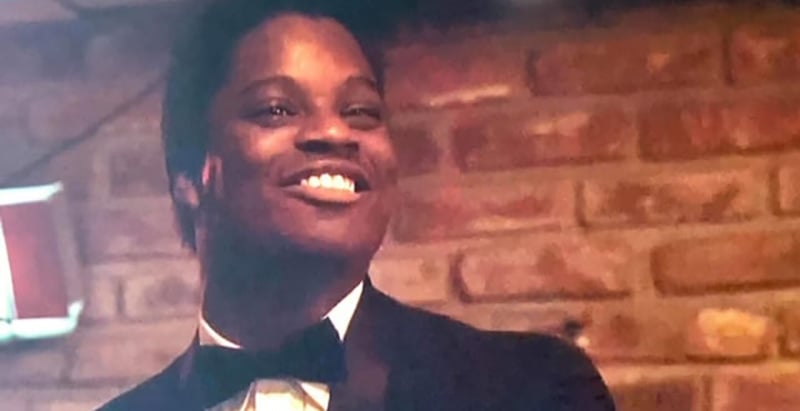
Robert Bailey in Animal House - photo courtesy Universal Pictures
Belushi cast Bailey and Cray as musicians in Otis Day’s backing band the Knights; Bailey is the piano player who chimes in with “Yeah yeah!” after Otis commands the Dexter Lake Club crowd to “Waaaaaait a minute,” while Cray, the legendary guitarist who went on to win five Grammy awards and get inducted into the Blues Hall of Fame, plays bass. While Belushi couldn’t find room on the stage for Salgado, The Blues Brothers skit on Saturday Night Live and subsequent movies were inspired by a Salgado performance Belushi enjoyed at the Eugene Hotel after filming Animal House’s legendary “Shout!” scene, and the group’s album “Briefcase Full of Blues” is dedicated to him.
If your college years are supposed to prepare you for your professional career, Bailey was ahead of the game. His nights on stage with Cray and Shinola had earned him quite a following, and in 1978, prior to his senior year at the UO, a Christian touring group named New Hope called and offered him $50 per week to take over for an ill vocalist.
“One of the singers got sick and had to leave the tour, and they needed a replacement quickly so I joined them and left school and lived for eight months in a Winnebago with seven other guys,” said Bailey. “Then we ended up in England for a month, and then we ended up in Scandinavia for about four months, based in Copenhagen and traveling to Norway, Denmark, and Sweden. Before that point I'd never been out of the country.”
That period in his life turned out to be momentously transformative, as Bailey left Oregon and began exploring the world just as he also began to understand more about his own place in it as a Black man.
“That was the year of Alex Haley's Roots,” he recalled. “I had just watched that series on television and had an inner awakening about racial things in this country. I saw the series first and then I went and bought the book and read it. After I read the book, I thought, ‘This guy is telling a very dark story, but he's telling it most incredibly,’ so I needed to know what else he'd written, right? So I went out and tried to find what else he'd written, and he'd written The Autobiography of Malcolm X. I was not a Malcolm X fan but I was certainly an Alex Haley fan, so I bought the book, and I came to a deeper, more positive understanding of Malcom X because of Haley’s masterful telling of his story. And in the middle of all of that came this opportunity to get away from the reality that I knew and add some perspective of some of the rest of the world.”
“Oregon was my first choice because I knew they had a great music school”
–Robert Bailey
But while Bailey was ready for the world, the world wasn’t sure it was ready for Bailey. He rarely slept on tour, staying with host families who kept him up at night wanting to talk about his hair and his life experiences.
“In a lot of cases, it was as if prior to my coming into their homes, they didn't really think that Black people were human beings, capable of cognitive thought, or had any intelligence at all,” he said.
“We were playing a church in Virginia, and that night there was no host family for me,” said Bailey. “I was told that I would go to a motel, and my people would have to get me to the motel and back to the gig. I was just so excited to have a moment alone from having my hair pawed and answering questions all evening.
“I went to the motel, freshened up, and came back to the church and we started the concert. The first three songs I had the lead vocal on the song, and after the third song the pastor stood up and stopped the concert. The congregation just went completely crazy. Half of the congregation was like, ‘Get him out of here!’ and the other half was like, ‘Let him sing!” We finally just packed up our stuff and left the church. The explanation was the congregation was just not ready to have a Black person leading worship at all in the church.”
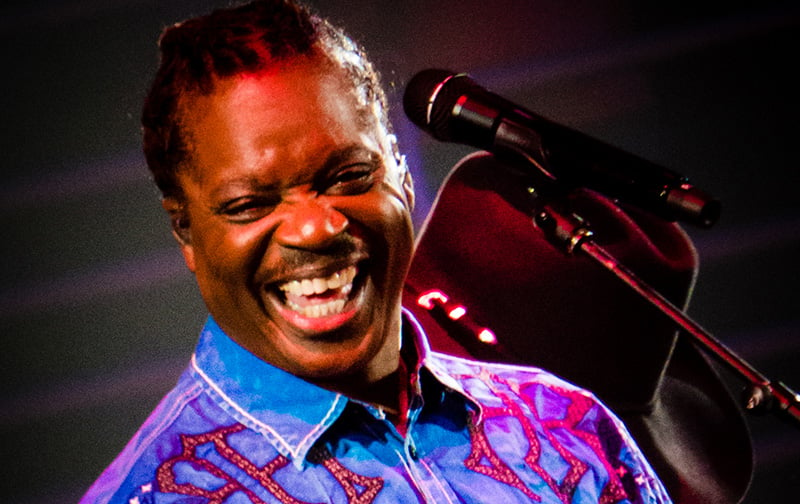
Photo courtesy Amanda Deets, Down Memory Lane Photography.
As the New Hope tour continued Bailey worked on his songwriting, and four of his original songs made it into the group’s setlists. New Hope’s owner was unhappy with the change of direction, and flew to England at the end of the tour to read the group the riot act.
“He called us into a room and said, ‘I don't like the new songs, the new songs are gonna have to come out and the old songs are gonna have to go back in,’” recalled Bailey. “We were practically done with the tour anyway, so we let him speak and then he left and we said we're just gonna go back to what we were going to do.”
At the end of the tour, New Hope’s owner disbanded the group, but tried to convince Bailey to sign over the publishing rights to his original songs so that his new group, patterned after New Hope, could use them.
“I wrote him a letter that basically said, I would be honored to have you use my music, but you can't own it, because it's not yours, it's mine,” said Bailey. “In retrospect, it was probably one of the smartest things I've ever done. It taught me about my own intellectual property and how to protect it.”
“When the product was finished, they put the cover of the record on the desk of the president of the record label, and he basically hit the ceiling. He looked at my face on the cover and said, ‘ Who authorized this? There is no way that we are going to release his records.’ ”
–Robert Bailey
Bailey returned to Eugene still the owner of his songs, and lived in an Airstream trailer while working at a Wendy’s in Springfield. After five months of flipping burgers—and three months behind on rent—he realized he couldn’t handle the job anymore and quit. As luck would have it, when he returned to his trailer after walking off the job, his phone was ringing—Jim and Tammy Bakker were looking for new singers for their television show, The PTL Club, and they wanted Bailey.
“That began a two-and-a-half year stint at The PTL Club in North Carolina as a PTL singer on TV, five days a week,” said Bailey.
In 1980, Bailey was offered a record deal by a Christian label based in Phoenix, Arizona. The label agreed to spend $40,000 on the album and told Bailey that whatever he wanted, he could have—“If I wanted the London Symphony Orchestra on my record I could have them,” he said.
There was just one insurmountable issue.
“When the product was finished, they put the cover of the record on the desk of the president of the record label, and he basically hit the ceiling,” said Bailey. “He looked at my face on the cover and said, ‘Who authorized this? There is no way that we are going to release his records.’”
The label had already pre-sold 30,000 copies of the record, and once they were gone, a small label in Nashville, Tennessee, bought the master and hired Bailey to be an in-house songwriter.
And that is where, after getting thrown out of a church and having a debut record deal dashed for being Black, Robert Bailey found out that rock bottom was still a few steps lower.
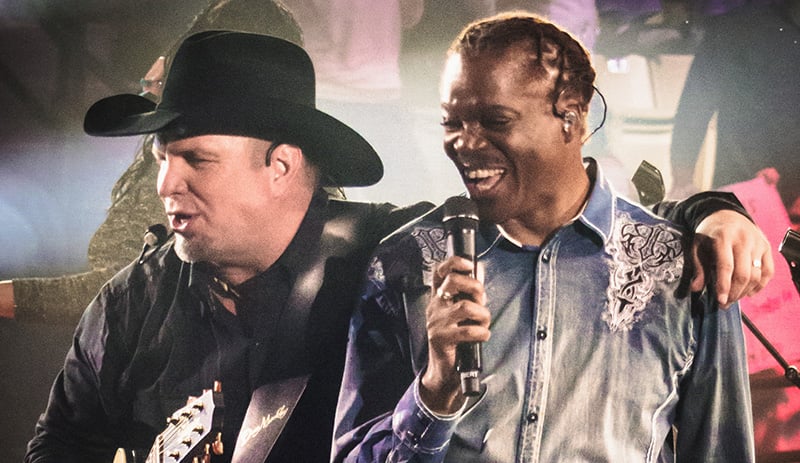
“If your message is love, and you see diversity on the stage that also helps. In country music there’s not a lot of diversity, so having him and Vicki out there, first of all for their talent, but it doesn't hurt at all to see some people that, you know, aren't all the same background singing together.” - Garth Brooks. Photo courtesy Amanda Deets, Down Memory Lane Photography.
“I am gay, and I always have been,” said Bailey. “But I grew up in a situation, religiously and 'familally,' where it was difficult to be me because it wasn't accepted.”
Bailey calls his time with New Hope, where he was able to leave the country and head overseas, an “era of discovery” that was good for him. But returning home, and being a closeted Black man in the homophobic Christian music industry, soon took its toll.
“That created a perfect storm in me, I just didn't know how to cope psychologically and I began to drink,” he said. “At first it was just to escape, but drinking turned into drugs and specifically marijuana and cocaine. Just before it was about to escalate into something far worse, I had an epiphany that I really needed to take a left turn, and deal with it. I did, with the help of a good friend of mine from Kentucky, who basically drove from Louisville, Kentucky, to Nashville and drove me to a drug rehab center where I spent 30 days and got clean in 1988.
“There was some trepidation, but I think it was more overridden by my $42,000 IRS debt and the fact that, you know, I really needed a job, I really needed to work.”
–Robert Bailey
“When I came out of treatment in ’88, all of my hopes were dashed, all of my dreams were basically flushed down the toilet. I was told, ‘Music is not where you ever need to go anymore because it's got triggers, it's got this, it's got that. You need to figure out something else to do with your life.’”
Looking back, Bailey describes that period in his life as a rebirth, and that is an apt description: it was confusing, chaotic, at times painful, but eventually transformative. For six months Bailey tried his hand at other jobs, but nothing made him as happy as music did. Then along came an offer to get on a bus and travel 13 hours to Minneapolis to do a one-off show with Wynnona Judd, who was getting ready to make her debut as a solo artist after almost a decade spent performing alongside mother Naomi.
At the end of the show, Wynnona asked Bailey to go on tour with her. Bailey—fresh out of rehab, and with warnings about the trappings of the music industry still ringing in his ears—was hesitant to say yes, but in the end agreed for one simple reason.
“There was some trepidation, but I think it was more overridden by my $42,000 IRS debt and the fact that, you know, I really needed a job, I really needed to work.”
Bailey stayed clean and was a tireless worker in Nashville, recording and touring with Wynnona while working alongside fellow vocalist Vicki Hampton, whom Bailey calls “the queen of recording sessions in Nashville.” With more than 175 credits to his name, including appearances on albums by Dolly Parton, Kenny Rogers, Reba McEntire, and Vince Gill, Bailey quickly became just as much a Music City staple as a fiddle or slide guitar.
It was inevitable, then, that he would eventually cross paths with the legendary Garth Brooks—the man with more album sales in the 20th century than any other artist, and the only artist in music history with seven diamond albums (sales of more than 10,000,000 units)—and their first time in the studio together, in 1992, launched a partnership that forever changed Bailey’s life.
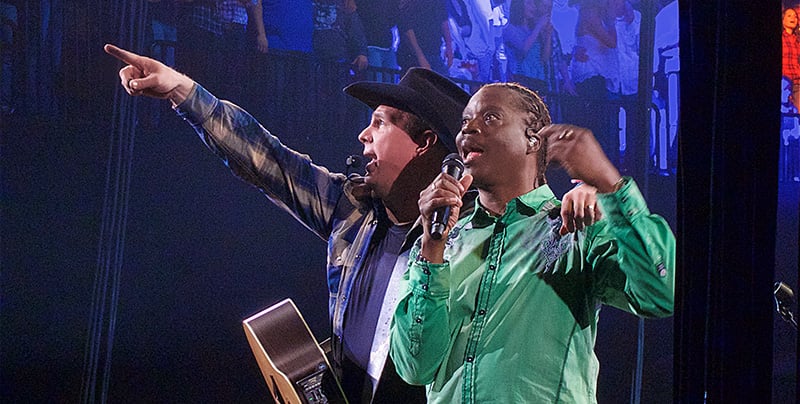
Garth Brooks and Robert Bailey perform together in Portland in 2015. Photo courtesy BluesJohnPhotography.
“It was a Christmas song,” recalls Brooks. “It was off the Christmas album, Beyond the Season, and Vicki Hampton introduced us. She brought him in. Donna McElroy and Vicki were leading the choir and they brought him in.”
“The session involved a large choir, maybe 16 singers,” said Bailey. “There were a lot of bodies in the studio, and Garth was a rising star at the time and all the singers who were there were kind of enamored with him, myself included. Afterwards, everybody wanted an autograph and everybody wanted a picture, and he was very, very accommodating to all of it, but I just couldn't do that. It just felt unoriginal. So I just thanked him for the opportunity to work with him, and he looked at me and he said, ‘You know, you didn't ask for a picture, and you didn't ask me to sign anything. What's up with that?’ I explained to him that it just had to feel more organic to me. I felt like that was kind of forced on him, and he was being sweet to do that, but I didn't want it to happen that way.
“He didn't say much then, he just shook my hand and it was over with, but from that moment on, every time he made a record he called me.”
Brooks found Bailey so indispensable that he added him to his touring band as well, and before he knew it, the singer who got his start on stage in sweaty, cramped bars in Eugene, was performing in some of the world’s biggest stadiums.
“I'm not sure if this guy's not even better on the road than he is in the studio, and he's amazing in the studio,” Brooks says. “You get him out on the road and the crowd just eats him up. As an entertainer, think of a long oval, that's what you're playing in. As an entertainer you cannot get to everybody at once. So the more people you have on that stage that command their corner, wherever they're at, those people are being entertained while you're entertaining somebody else. That takes a load off your shoulders. This guy is an entertainer extraordinaire, without stealing the show or taking away from it. That's a great balance and this guy checks all those boxes. He’s a perfect 10 for me."
As a Black man in the historically white country music industry Bailey is helping break down barriers, paving the way for artists like Darius Rucker and Lil Nas X. Some of that is merely a byproduct of Bailey being himself, but some of that is a deliberate move by his collaborators to diversify the industry.
“This guy is an entertainer extraordinaire, without stealing the show or taking away from it. That's a great balance and this guy checks all those boxes. He’s a perfect 10 for me.”
–Garth Brooks
“Wynnona was changing the course of the music with her own originality, and doing crazy things like having two of her three backup singers be Black, her bass player was Black for a time, and she always had people of color in her entourage and on-stage band,” said Bailey. That was earth shattering for country music, but she knew exactly what she was doing and she didn't care. She made that statement.”
“If your message is love, and you see diversity on the stage that also helps,” said Brooks. “In country music there’s not a lot of diversity, so having him and Vicki out there, first of all for their talent, but it doesn't hurt at all to see some people that you know aren't all the same background singing together.”
Life in Garth Brooks’ band is an adventure, and not just because the Winnebago and homestays have been replaced by private jets and five-star hotels. There was the time Brooks called Bailey and told him he was sending a plane to Nashville to pick him and Hampton up so that they could sing with him at the People’s Choice Awards in Los Angeles, and added that the plane would stop in Oklahoma en route to LA to pick Brooks up and they’d all just decide what song they’d sing at that point. There are the nights on tour when Brooks arranges for certain stores to stay open late at night, then surprises his band members with gift cards and lets them go shopping on their own after a show is done. Then there was the Garth Brooks World Tour, where the band played 390 shows in three years, including multiple shows per day in some cases.
“To be honest, my voice held up better than my body,” laughs Bailey. “I never lost my voice in those three years, you know, and I think that was the result of Dr. Breidenthal and my U of O training. The voice was the thing that I worried about the least. When I started the tour I weighed 240 pounds. When the tour was over I weighed 189. I never did any kind of extra exercising, I never changed my diet, it was just all that running around the stage.”
And then there are the nights, like one memorable one in 2005, where Bailey turns the tables and is the one to surprise Brooks.
“I’m sitting at home and got a call from Jack Sussman at CBS, and he said they’re going to do a telethon for Hurricane Katrina, and they're gonna throw us with Paul Shaffer,” said Brooks. “So we're doing 'Who’ll Stop the Rain?' and I'm playing it on the plane going down there, and [Bailey] goes, ‘You know, that's not in E minor.’ I said, ‘What?’ He said, ‘It’s this other key.’ We get there, and Shaffer's group’s all playing in E minor. Robert just sits there quietly, until I say, ‘Hey guys, can I ask you a question? Robert, do you want to talk to them about this?’ And Robert just stepped right up, and I’m like ‘Holy shit,’ he just stepped right up to these guys and goes, ‘That's not in E minor, it's actually this key. And when they played it, the song sung, I mean it just it just flew.
“He's frickin it, very intelligent. He plays that part down like a good entertainer will, but this guy knows his shit. You'd be best to follow him when he says what he says.”
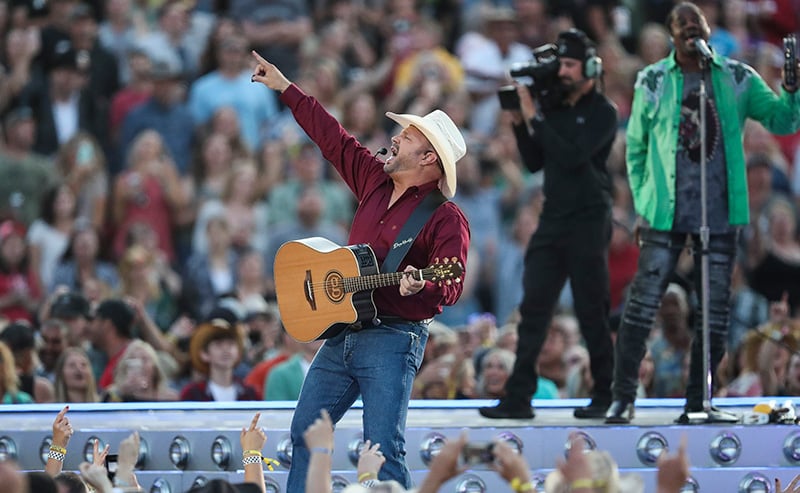
Garth Brooks and Robert Bailey perform at Autzen Stadium. Photo courtesy Eric Evans.
When Brooks performed to an Autzen Stadium-record crowd of 60,000 in June 2019 during the Garth Brooks Stadium Tour, fans were on their feet all night singing along. “Two Pina Coladas.” “Ain’t Goin’ Down (‘til the Sun Comes Up).” “The Thunder Rolls.” “Callin’ Baton Rouge.” “Friends in Low Places.”
Brooks rolled through hit after hit from his extensive catalog, reinforcing his reputation as one of the best live acts in music. But the night’s showstopper was the one song where the country music legend did not have the spotlight all to himself, and it was a moment inspired a few years earlier.
“I'm at home one evening and get a text message from Trisha (Yearwood, Garth Brooks’ wife and a three-time Grammy Award-winning country singer and Emmy Award-winning television show host),” said Bailey. She says, ‘You’re not gonna believe what we're watching on TV right now.’ It was one of those reruns of Animal House. I think she had heard me when I’d said I was kind of in the movie, but Garth’s daughter, Allie Coleen, actually spotted me in the scenes that appear in the movie. When Trisha sent me that text message, I already knew that the Boss Man had seen it.”
It turns out though that Brooks already knew. Fans had begun holding up signs to request “Shout!” during concerts, and the band quietly let Brooks know one day that his backing singer was more than a little familiar with the song. During soundcheck before a show in Tacoma in late 2017, Brooks asked the band to learn “Shout!” for an upcoming show, and then threw Bailey a curveball.
“He's really proud of being a Duck because he wears the gear everywhere. This guy has been everywhere on the planet, I’ve got pictures on the world tour somewhere with him in an Oregon shirt when we were in Germany or something. He's just that kind of guy.”
–Garth Brooks
“He comes on stage and wants to rehearse it,” said Bailey. “We started rehearsing it, and he's like, ‘Okay, where's your part? Come in on your part.’ I'm like, ‘What do you mean my part?’ And that's when I learned that he wanted us to sing it together.”
“In the arenas you can pull that off, because the arenas are much more up close,” said Brooks of the “Shout!” back-and-forth he rehearsed with Bailey. “In a stadium, pulling that off is impossible unless you have Robert Bailey. The crazy thing about Robert is he's so unassuming, but the second the light hits he becomes larger than life and it shocks everybody. It shocks me even when I see it, because each time we do it, which is very rare, he becomes bigger and bigger in his personality. I love it because I'm being entertained at the same time as they are, and I think you see it.
“You're gonna have a lot of gifts kind of dropped at your feet as an entertainer when you’re traveling. Someone’s gonna go ‘Hey, you’re not going to believe this, but the guy that's running sound went to the University of Nebraska, and guess where we're playing? Lincoln.’ It's always homeboy makes good or homegirl makes good, but then what you do is introduce like the kid in Nebraska that I’m talking about. He's always worn a hat because he shaves his head, always. I introduced him and the crowd went nuts, and he takes his hat off and he's got a big fucking red “N” painted on his head. Well as you could imagine this place went from stupid nuts to ballistic.
“So when we're rolling into Oregon, we got an alumnus from there, and Animal House was shot there. You're gonna stick it all together, and you're going to have a hell of a ball.”
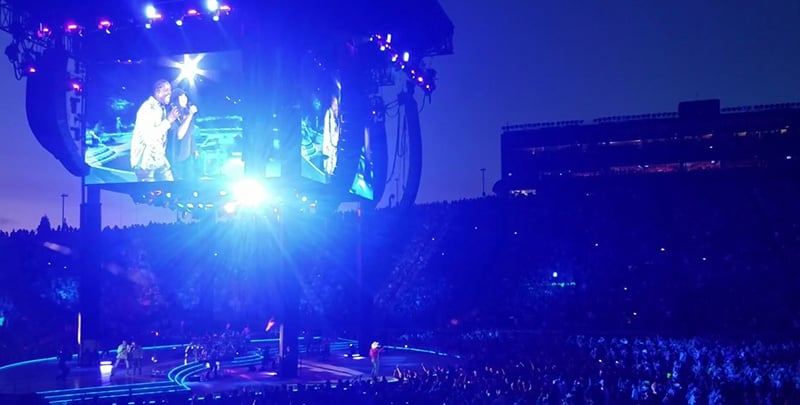
Robert Bailey sings "Shout" with Garth Brooks during a concert at Autzen Stadium in 2019. Photo by Damian Foley.
And that’s exactly what happened. Midway through the first part of the set—right after “We Shall Be Free,” which featured an 800-person gospel choir Bailey helped arrange—the band launched into “Shout!” The crowd, energized from preshow tailgates and more than a little used to singing the classic tune in Autzen Stadium at the end of the third quarter of every Ducks football game, erupted.
It was a perfect homecoming for Bailey, who hasn’t lived in Oregon since he left his Airstream trailer and his job at Wendy’s behind in 1981 to move to North Carolina but still loves his alma mater.
“He's really proud of being a Duck because he wears the gear everywhere,” said Brooks. “This guy has been everywhere on the planet, I’ve got pictures on the world tour somewhere with him in an Oregon shirt when we were in Germany or something. He's just that kind of guy.”
From nights spent playing with Robert Cray in the Eugene Hotel to one unforgettable evening performing to a sold-out Autzen Stadium with Garth Brooks, Bailey’s career has been shaped by Eugene and his years at the University of Oregon. The potential instilled in him by Joan and Robert Sr. became a fully-fledged reality in the School of Music and Dance, and Leslie Breidenthal’s lessons still ring in his ears four decades later, helping him shine a little light to country and Christian music fans alike.
“He was very kind, very brilliant in his approach to me,” said Bailey. “The things that he taught me and the things that I learned in general, the things about theory and vocal training and all of that, those things are still uppermost in my mind now.”
- Damian Foley, UO Communications
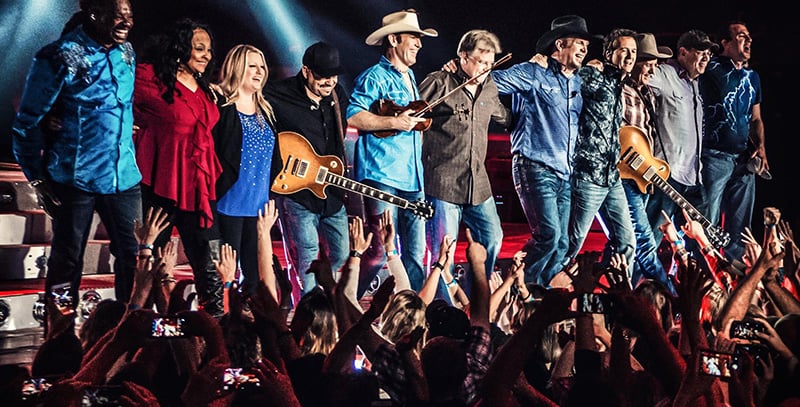
Robert Bailey, far left, takes a bow with Garth Brooks and his band at the end of a show. Photo courtesy Amanda Deets, Down Memory Lane Photography

